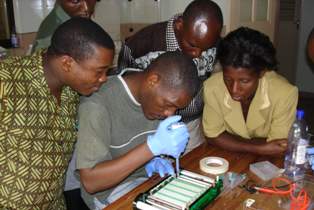Liverpool School of Tropical Medicine to develop field kit to detect insecticide resistance in mosquitoes
28 May 2009
Liverpool School of Tropical Medicine (LSTM) has been awarded a £1.1m grant by the US National Institutes of Health to lead a five-year project to develop a Field Applicable Screening Tool (FAST) kit to detect resistance to public health insecticides in mosquitoes.
The two principal methods for control of malaria in sub-Saharan Africa are the use of insecticide-treated bednets (ITNs) and indoor residual spraying (IRS) of insecticides.
Scientists at LSTM, the Centers for Disease Control and Prevention in the US, Ghana’s Biotechnology and Nuclear Agricultural Research Institute and Uganda’s National Livestock Resources Research Institute will be working in partnership to identify genes that render malaria-carrying mosquitoes resistant to a range of insecticides that are used for IRS and ITN.
At present information on underlying resistance mechanisms of the two most important mosquito species is very limited.
Based upon this knowledge, a rapid and cost-effective DNA-based screening kit will be designed, tested and rolled out for use by control programme staff in the regions of sub-Saharan Africa where malaria and filariasis, a disabling and disfiguring condition also spread by mosquitoes, is endemic.
The new screening tools will provide information vital for predicting the success of IRS and ITN programmes.
Project leader Dr Martin Donnelly, Senior Lecturer in Vector Biology at LSTM said: “Malaria control in Africa is reliant upon the use of insecticides against mosquitoes. Therefore if the mosquitoes develop high levels of resistance to these insecticides the public health impact could be devastating.
"We are proposing to develop DNA-based tests which are sensitive enough to detect resistance when it is at a low level and thereby enable control programme staff to take action to reduce the build up of resistance.”
The rollout of FAST kits will be facilitated in collaboration with existing programmes run by IVCC, TDR (a World Health Organisation programme for research and training in tropical diseases) and PMI (US President’s Malaria Initiative).

Malawi scientists conduct DNA-based tests
Bookmark this page